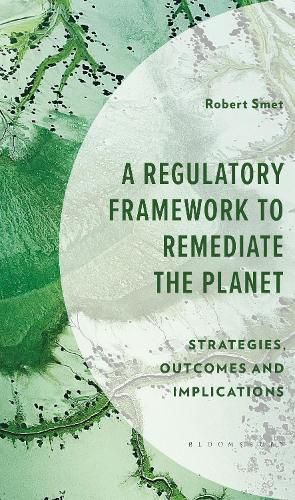Readings Newsletter
Become a Readings Member to make your shopping experience even easier.
Sign in or sign up for free!
You’re not far away from qualifying for FREE standard shipping within Australia
You’ve qualified for FREE standard shipping within Australia
The cart is loading…






Ubiquitous environmental pollution and how we regulate it is now a more critical issue than ever. A Regulatory Framework to Remediate the Planet: Strategies, Outcomes and Implications develops an optimal regulatory strategy to minimize human-generated environmental harms by the generation of multi-media pollution and postulates a means to use this strategy "in reverse" to restore Nature's ecosystems. The strategy first includes reforming key aspects of the Clean Air Act, using the core strategy to likewise regulate the generation of solid waste pollution, and facilitate the transition to a circular economy. The author shows that this core strategy will holistically regulate the generation of multi-media environmental pollution, i.e., air, water, onsite generated waste, and solid waste pollution. He further argues that these outcomes are only possible through the intelligent use of rigorous, limit-based regulation, employing the proper blend of command-and-control and market-based instruments, rooted in an underlying structure that can be applied as a regulatory strategy across all environmental media.
$9.00 standard shipping within Australia
FREE standard shipping within Australia for orders over $100.00
Express & International shipping calculated at checkout
Stock availability can be subject to change without notice. We recommend calling the shop or contacting our online team to check availability of low stock items. Please see our Shopping Online page for more details.
Ubiquitous environmental pollution and how we regulate it is now a more critical issue than ever. A Regulatory Framework to Remediate the Planet: Strategies, Outcomes and Implications develops an optimal regulatory strategy to minimize human-generated environmental harms by the generation of multi-media pollution and postulates a means to use this strategy "in reverse" to restore Nature's ecosystems. The strategy first includes reforming key aspects of the Clean Air Act, using the core strategy to likewise regulate the generation of solid waste pollution, and facilitate the transition to a circular economy. The author shows that this core strategy will holistically regulate the generation of multi-media environmental pollution, i.e., air, water, onsite generated waste, and solid waste pollution. He further argues that these outcomes are only possible through the intelligent use of rigorous, limit-based regulation, employing the proper blend of command-and-control and market-based instruments, rooted in an underlying structure that can be applied as a regulatory strategy across all environmental media.